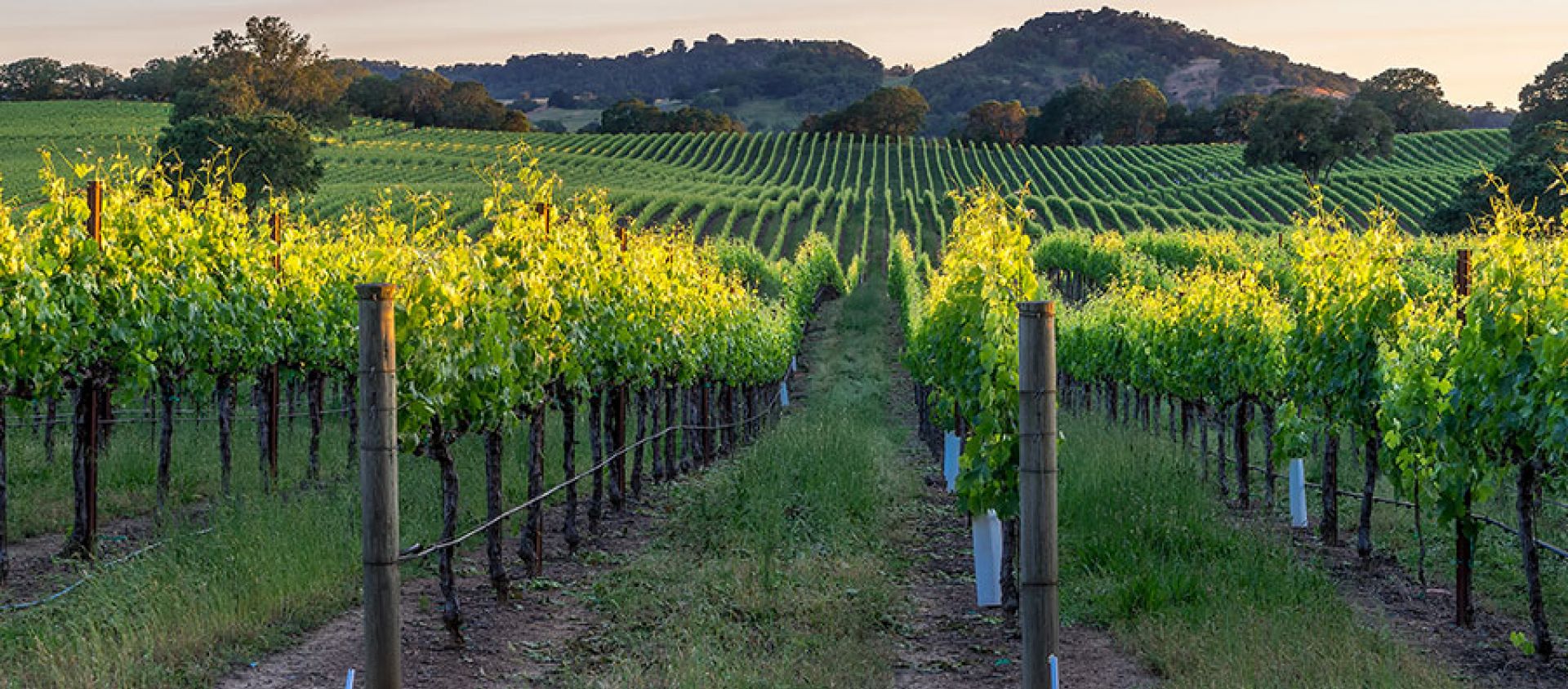
Insights
Sustainability In The Wine Trade
What drives it and how can you implement it in your business
Sustainability is a very difficult goal to achieve but never impossible. This article dives deep into understanding ways to kickstart sustainability in the right direction.
Sustainability is a much bigger concept than what one comprehends. It not only has an impact on nature or the environment but affects the entire ecosystem. Here, sustainability means, that the entire winemaking process from growing grapes to making wine, from bottling to logistics has the least impact. It not only affects the wineries in terms of production but also the wine community that is trying to adapt to it. It is one of the first steps to achieving a reduced carbon footprint, a healthier environment, and a balanced ecosystem.
The Shift
The concept of sustainability hasn’t been practiced as much as it has been spoken about. Everyone knows it is the right thing to do and might eventually get around to practicing it but the question of ‘when’ remains. There is a vast awareness of a depleting ecosystem that needs immediate saving but most people seem clueless on the ABCs of sustainability. Others just don’t prioritize it as much. Consider it the need of the hour and act on it today.
Know Why
As a business or even as an individual one must know what is at stake. Martin Reyes MW points out that once the ball starts rolling, it’s going to go downhill, and then it may be too late to stop the consequences of actions, intentional or unintentional. According to the Stockholm Resilience Institute in Sweden, their sustainability graph has records of climate dating back to thousands of years which point out chaotic shifts in climate that stabilized over time that points out the sprouting of civilization which has been stable for the past 10000 years with minor fluctuations. We may be good for now but it can “wreak havoc” at any time, ending life as we know it.
The take here is that climate is the be-all and end-all of our existence.
Approaching this sustainability crisis with optimism is the best way to tackle it. Wineries are adopting the “ground to glass” policy when approaching their sustainability practices. Spread the word. World Resources Institute mentions that 21 countries since 2000 have actively worked on reducing their carbon footprint thereby seeing an increase in their GDP. News like this spreads to a point where even company CEOs are implementing sustainability components in their business decisions.
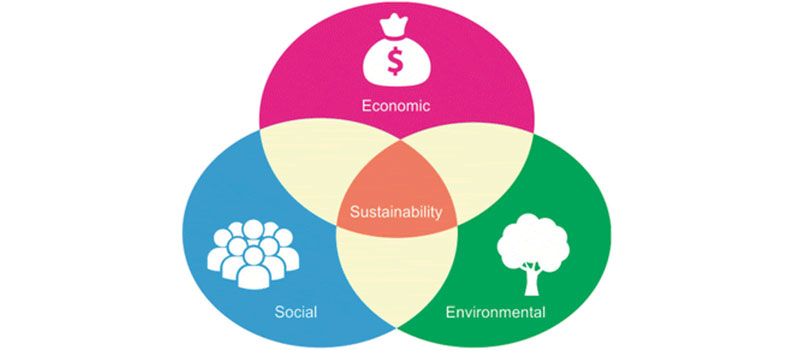
The 3 P’s: People, Planet, and Profit, Source: Springer Link
Factual Comprehension
The 3 P’s of sustainability: People, Planet, and profit. The people and planet parts are quite self-explanatory in the sense that change comes from within. People working towards a sustainable environment can collectively build a sustainable planet. Growing together as a community is crucial to the sustainability practice. Winemaking is labor-intensive and there have been instances where wineries have been accused of misusing their manpower. To keep up with the sustainability aspect, importers have begun demanding labor statistics from producers. Now the real emphasis is on Profit. It is only possible if your business is sustainable and has the means to implement it. One does need to keep aside portions of their profits to introduce sustainability practices in and around work.
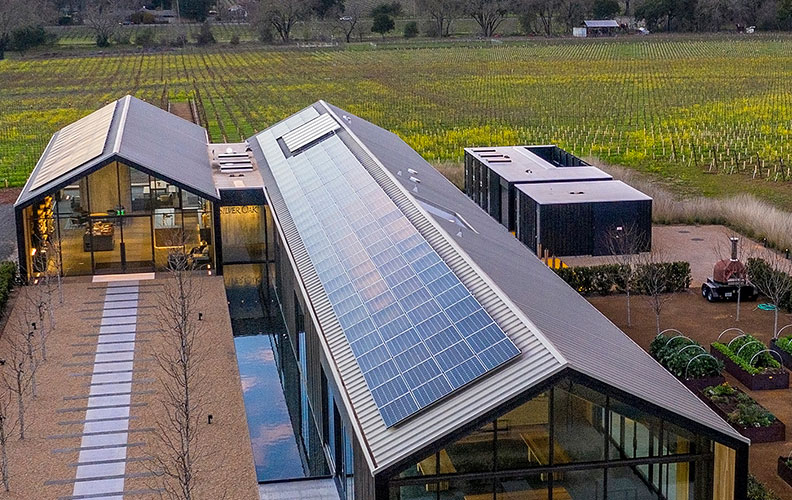
Silver Oak Winery is the world’s most sustainable winery, Source: SilverOak
Martin mentions that in the wine business, there are 6 main principles that constitute the philosophy of sustainability that require immediate attention.
Climate Action: Helping out greenhouse gas emissions, adapting to changing climate and understanding the causes for it, and working our way backward. Being climate positive includes converting energy sources from gas to electric and solar energy.
Water Efficiency: using treated wastewater is an efficient way to save water resources. Turning on sprinklers or drip irrigation only when there is a severe need for it increases its efficiency which in turn builds stronger roots that reach the groundwater.
Energy Efficiency: Treasury Wine Estates, in Napa Valley, has set a target to achieve net-zero emissions by 2030. Energy efficiency is crucial in reducing carbon footprint. St Hallett Winery in Australia reduced the use of electricity employing flotation to remove sediments instead of freezing for settling. This allows for increased processing efficiency while using less power.
Social Equity: assesses the degree of unequal distribution of resources that contribute to the balance or imbalance in the environment. Communities, air, water, tangible and intangible resources contribute to this decision.
Pesticide Reduction and Waste Reduction are the other factors that greatly contribute to social responsibility.
One of the biggest misconceptions about sustainability is the thought that becoming an organic or a biodynamic vineyard deems one sustainable. What most professionals fail to realize is that it is only part of the solution. Research states that a lot of the carbon footprint in the wine trade comes from organic, biogeochemical field emissions in vineyards and glass bottle packaging. Vineyards contribute to 40% of the carbon footprint of wine. It has to start from somewhere and most vintners believe sustainability, just like wine, starts in the vineyard. Karissa Kruse, president of Sonoma County Winegrowers states “Sustainability is one of the most natural programs, at a very local level, at a farming level to combat Climate change”.
Greenwashing is a concept used by a lot of businesses as a marketing gimmick to brainwash and persuade the public into thinking that the product being sold is environmentally friendly. One cannot throw in solar panels onto their land and term themselves sustainable. This brings about doubt and makes it harder to find entirely sustainable and genuinely good products. On the bright side, organizations are emerging in the wine industry which is coming forward, inspecting and providing certifications to those wineries who deserve that sustainability stamp.
Do customers even care whether you’re sustainable? Absolutely. More and more consumers are questioning the authenticity of the wine or the spirit and only once convinced, are making the purchase. Since the pandemic people are turning to more sustainable products. Some surveys, however, state that consumers find it hard to figure out what product matches the profile with all the greenwashing happening around them.
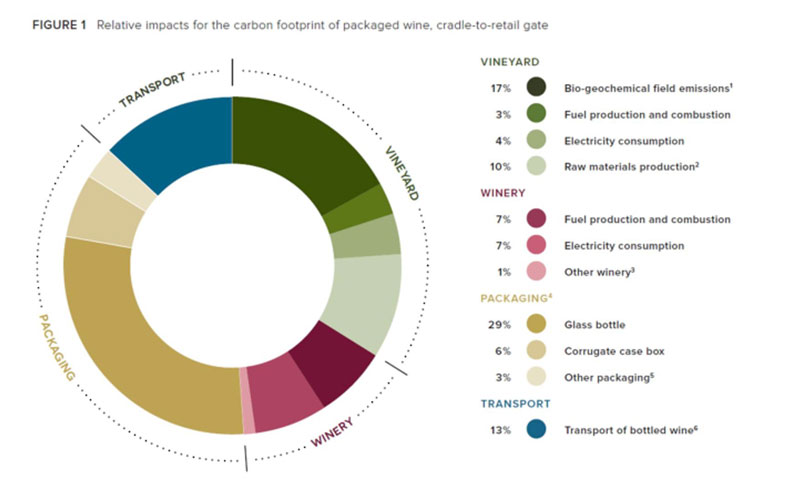
Areas resulting in carbon emission in wine, Source: Tablas Creek
Act on the Identified Opportunity
Reyes believes that businesses using the sustainability model are underselling their product and that seems true since a survey conducted with 450 wine trade professionals states that 76% of the demographic stated that demand for sustainably produced wines and spirits will grow in the next 10 years.
This brings us to the profitability aspect of a business. No business can expect to follow these practices if they're out of business. For starters, we could recognize the opportunity in front of us, manage resources and finances. A very good example is regenerative farming/agriculture or carbon farming that is being adopted by a lot of wineries now, where you can find ways to maintain the health of your soil, which essentially means that its water retention capacity increases. It reduces fertilizer costs since the soil is healthy and above all it increases the plant’s vigor on growing degree days, thus reducing its carbon footprint. Fun fact: If you are to irrigate mature vines in France, your appellation d’origine contrôlée will be most likely be revoked. Some farmers are adopting alternative rootstocks and heat-resistant grape varietals. Always become energy-efficient before6 shared principles constitute investing in your renewable resources. Sonoma County Winegrowers are the world’s first 100% sustainable community and that is a big milestone.
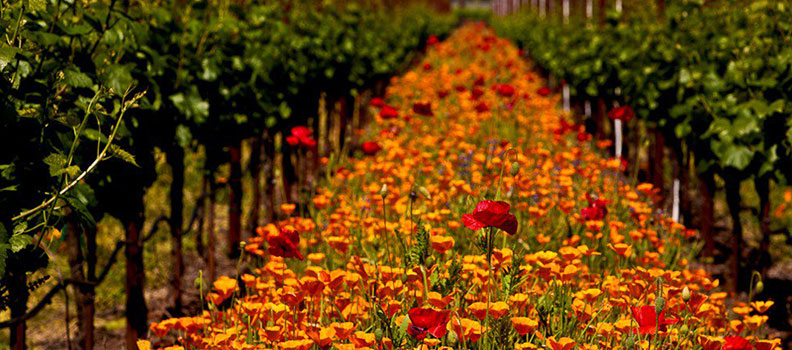
Poppies used as cover crops - An Initiative by Sonoma County Winegrowers, Source: Along The Wine Road
Sheep rearing, growing cover crops (rye, buckwheat, cowpea, etc.) in between trellises, composting, are other factors considered very important in maintaining a balance in the ecosystem.
Wineries or even distilleries produce a significant amount of carbon footprint, especially in the bottling area and packaging unit. Investing in renewable resources may reduce your carbon emissions but not as efficiently as adapting to efficiency. Now what this signifies is that once you find ways of being efficient in your workspace, the need for renewable energy will be reduced by a significant amount, thus reducing carbon footprint.
One of the most well-known third-party organizations is the Stellar Certification Services which certifies sustainable wineries and vineyards.
Reach out
Being termed sustainable isn’t the final destination for the beverage industry. It doesn’t mean they can forget about it now and go back to what was. It is just the beginning. One has to hold up their end and maintain that sustainability standard. This is where the people aspect comes into play. The model for sustainability doesn’t just mean reducing carbon footprint or building a sustainable business. As stated earlier, It is a balanced ecosystem, between people, planet, and profit. Building a sustainable future in a business also means taking care of the people involved in the process which includes the employees, people of the community, etc. It may seem a very trivial subject but studies show that sustainable businesses have always thrived better than those that are not.
Start Now
When in doubt, reach out to somebody who can help out. If you’re clueless about how to begin your sustainability journey, find someone who can or talk to people who are in the game. Sustainability is the solution to past, present, and futuristic problems and we must inculcate it in our personal and professional lives. Ask yourselves, if not you, who? If not now, when?
Header Image Source: ProAg, Sonoma County, world’s first 100% sustainable acreage
Article written by Kritika Shenoy, Beverage Trade Network
Become a USATT exhibitor and grow your distribution in the USA. Meet importers, distributors, retailers and press. Get exhibitor information here.


